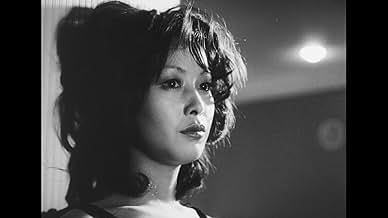VALUTAZIONE IMDb
6,2/10
1121
LA TUA VALUTAZIONE
Aggiungi una trama nella tua linguaA revolutionary faction steals some hand bombs. While escaping, several soldiers are killed. The movement's highest authority deems October unfit and sends the leader of another faction to t... Leggi tuttoA revolutionary faction steals some hand bombs. While escaping, several soldiers are killed. The movement's highest authority deems October unfit and sends the leader of another faction to take the remaining bombs.A revolutionary faction steals some hand bombs. While escaping, several soldiers are killed. The movement's highest authority deems October unfit and sends the leader of another faction to take the remaining bombs.
- Regia
- Sceneggiatura
- Star
Recensioni in evidenza
I watched this film, with very little knowledge of Koji Wakamatsu and his films. I had recently seen "Dare to Stop Us" a film about Wakamatsu through the eyes of his assistant. Actually, it was through that film that I became more interested in his work. Fortunately, a museum where I live was doing a small retrospective that included Ecstasy of Angels.
I really didn't know what to expect, and having seen "Dare to Stop Us" I was expecting a micro-budget affair and very amateur performances. My experience was the exact opposite. Wakamatsu definitely knew how to make films and I was pleasantly surprised by the performances. I really enjoyed Ecstasy of Angels.
A brief summary of the film; a group of radical activists soon turn on one another after stealing a large amount of explosives from a US Army base. The characters have unusual names such as Monday and October, and the sects themselves are named after the seasons. I wasn't able to actually follow who was who by their names, however, but each character was distinctive enough that I could follow what was going on.
That is essentially the plot of Ecstasy of Angels. We watch the different radical groups fall apart and turn on each other. It's a study of power dynamics. What made me so fascinated with this film, is how well paced Wakamatsu was able to deliver the plot. I was never bored. He does some interesting things shifting back and forth from black and white and color. The film also contains a fair amount of sex and nudity. However, the sex is simulated, and other then women's breasts you really don't see anything too graphic, especially by today's standards.
Ecstasy of Angels is very much an art film and it is low budget. I think fans of Wakamatsu and early 60s Japanese filmmaking would enjoy this film. I'm not sure the average movie-goer would however. In fact, in an auditorium of about 40 people, around 10 people left during the film. Not exactly a ringing endorsement. But I'm endorsing it, I liked it from beginning to end and maybe you will too.
Give Ecstasy of Angels a chance and see it if you ever get the opportunity.
I really didn't know what to expect, and having seen "Dare to Stop Us" I was expecting a micro-budget affair and very amateur performances. My experience was the exact opposite. Wakamatsu definitely knew how to make films and I was pleasantly surprised by the performances. I really enjoyed Ecstasy of Angels.
A brief summary of the film; a group of radical activists soon turn on one another after stealing a large amount of explosives from a US Army base. The characters have unusual names such as Monday and October, and the sects themselves are named after the seasons. I wasn't able to actually follow who was who by their names, however, but each character was distinctive enough that I could follow what was going on.
That is essentially the plot of Ecstasy of Angels. We watch the different radical groups fall apart and turn on each other. It's a study of power dynamics. What made me so fascinated with this film, is how well paced Wakamatsu was able to deliver the plot. I was never bored. He does some interesting things shifting back and forth from black and white and color. The film also contains a fair amount of sex and nudity. However, the sex is simulated, and other then women's breasts you really don't see anything too graphic, especially by today's standards.
Ecstasy of Angels is very much an art film and it is low budget. I think fans of Wakamatsu and early 60s Japanese filmmaking would enjoy this film. I'm not sure the average movie-goer would however. In fact, in an auditorium of about 40 people, around 10 people left during the film. Not exactly a ringing endorsement. But I'm endorsing it, I liked it from beginning to end and maybe you will too.
Give Ecstasy of Angels a chance and see it if you ever get the opportunity.
Koji Wakamatsu's "Ecstacy Of The Angels" runs for a mere eighty-nine minutes. After it ended it felt more like eight nine hours. Wakamatsu, known as the "Pink Godfather" (no, don't ask me why), was a pioneer of the pinku eiga genre. I had never heard the name Wakamatsu before. According to the blurb in the festival guide, "Ecstacy of The Angels" is a parable about a revolutionary organization torn apart by betrayal, its members descending into paranoia, sadism and sexual decadence. It sounded like a plot from an early Godard film, only from a Japanese perspective. This sounded interesting, I thought. It was about as interesting as having a tooth extracted. The opening sequence, in black and white, is set in a nightclub. A female singer screeches absurd lyrics, while at a nearby table three men and a woman sit in silence. Pretty soon though, I couldn't figure out which revolutionary faction was which, and by that time I was beyond caring. The actors don't just speak their lines, the bellow them at each other, as if they were all auditory challenged. In the frequent sex scenes (which are about as erotic as two storefront mannequins coupling), they go through the motions of sexual congress while mouthing absurd platitudes about fighting for the revolutionary cause. Frankly, Wakamatsu is definitely no match for Godard. Which reminds me, I need to visit my dentist for a check up. It'll be less painful all round.
I found I liked this a little less than I did when first seen on video a few years ago. Perhaps it just shows what effect 9/11 and subsequent worldwide terrorist activities have had on our psyche. This remains a well put together, exciting and amusing tale of confused young fighters (for they know not what) on the streets of Tokyo late 60's. The pace and style of Wakamatsu's film making is infectious but the pain of events and concerns for safety have made it much more difficult to be sympathetic to lost youth taking it out on innocent people. It's a shame because this, almost Godard like, movie so full of vitality, could inspire many to take up the making of movies but instead one is now frightened that the vulnerable might be encouraged in their cowardliness to take out others for a bit of glory. A sad reflection of the times we find ourselves in. Good film though!
The film is a dated, incoherent, and pretentious rambling about fictional revolutionary, or rather quasi-revolutionary, terrorist group(s) in Tokyo in the sixties. Although there may be some resemblance to early Godard, Wakamatsu seems to be much less accomplished thinker, revolutionary, or craftsman than the French master of the New Wave. Notwithstanding the typically Asian overacting, all the persons in the "plot" act as detached mechanical puppets (perhaps intentionally?). They are not good in making either revolution or love. The frequent sex scenes were quite irritating not only because the participants recited quasi-political slogans, but also due to sometimes awkward choreography or cuts necessitated by the bizarre Japanese censorship law that does not allow a glimpse of pubic hair on the screen.
I wonder if the sign "WEAPON WEARHOUSE" on a weapon warehouse in the film is a joke for insiders or rather a testimony on the level of production values in this movie.
I wonder if the sign "WEAPON WEARHOUSE" on a weapon warehouse in the film is a joke for insiders or rather a testimony on the level of production values in this movie.
A bunch of young Japanese terrorists named after weekdays follow the orders of a terrorist named after a month: October. They steal some boxes of bombs from a US Army warehouse (the sign in the movie actually says: weapon wearhouse). They are found by two US soldiers. There's a shooting. A bomb explodes in October's face. He is blinded but alive. That is the opening scene of the movie, after that the plot is quite thin for the rest the "story".
The style of the movie is similar to Jean Luc Godard's early films but Koji Wakamatsu makes a film that has the actors reciting political slogans all throughout with random scenes of sex and violence. I am actually not sure if it was meant to be a serious film, but I actually found it quite funny and I enjoyed it as a Z grade pseudo philosophical porn terrorist comedy.
Ecstasy of the Angels is definitely not a great film but it was interesting and funny.
The style of the movie is similar to Jean Luc Godard's early films but Koji Wakamatsu makes a film that has the actors reciting political slogans all throughout with random scenes of sex and violence. I am actually not sure if it was meant to be a serious film, but I actually found it quite funny and I enjoyed it as a Z grade pseudo philosophical porn terrorist comedy.
Ecstasy of the Angels is definitely not a great film but it was interesting and funny.
Lo sapevi?
- QuizThis film was released in a time of violent social turmoil for Japan. ATG, the film's distributor, got cold feet when a rash of Christmas tree bombing, similar to the one in the movie, started to plague the streets of Tokyo. The film was quickly withdrawn from distribution and briefly re-released in the art theater circuit.
- BlooperWhile the revolutionaries enter the base, a sign reading "weapon wearhouse" instead of "weapon warehouse" is clearly visible for several seconds.
- ConnessioniEdited into Gli ultimi giorni dell'umanità (2022)
I più visti
Accedi per valutare e creare un elenco di titoli salvati per ottenere consigli personalizzati
- How long is Ecstasy of the Angels?Powered by Alexa
Dettagli
Botteghino
- Lordo in tutto il mondo
- 585 USD
- Tempo di esecuzione1 ora 29 minuti
- Colore
- Mix di suoni
- Proporzioni
- 2.35 : 1
Contribuisci a questa pagina
Suggerisci una modifica o aggiungi i contenuti mancanti

Divario superiore
By what name was Estasi degli angeli (1972) officially released in Canada in English?
Rispondi

















